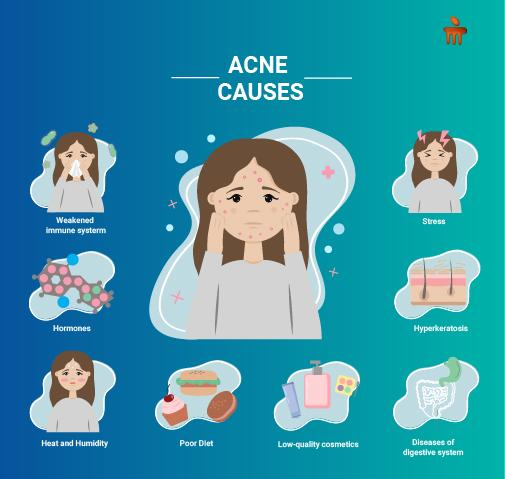
One of the most common skin disorders among adolescents and young adults, acne occurs when the hair follicles become plugged with dead skin cells and oil. These blockages produce whiteheads, blackheads and various types of pimples, which are small bumps on the skin, painful and generally filled with pus. Clinically, acne is called acne vulgaris.
Research has found that acne affects around 85% of adolescents and often extends into adulthood. Moreover, studies have also found that 9.4% of people across the globe have acne. As per the American Academy of Dermatology (AAD), acne is one of the most prevalent skin disorders globally.
Although it is widely considered merely a cosmetic disease, it is usually associated with significant physical impairment and thus, commonly leads to low self-esteem and social dysfunction, which, if not managed timely, can cause depression, anxiety, obsessive compulsiveness and sometimes even suicidal thoughts. Additionally, acne can cause considerable skin damage if not treated timely.
Different Types of Acne
According to the best dermatologist in Bangalore, people with acne often notice a mix of various types of pimples. Blackheads and whiteheads, also known as comedones, are the most commonly reported acne lesions.
-
Whiteheads
Also referred to as closed comedones, whiteheads develop as raised bumps under the skin’s surface. They don’t have any distinct colours.
-
Blackheads
These open comedones open at the skin’s surface. Oxygen in the air gives the top part of these pimples their darker colour.
Inflammatory lesions, which are often responsible for the scarring of the skin, include:
-
Pustules
These tiny, red pimples have pus at the tips.
-
Papules
These small, raised, infected or inflamed hair follicles cause red bumps.
-
Cysts
These large lumps located beneath the skin are quite painful and usually contain pus.
-
Nodules
These solid, painful lumps occur beneath the skin’s surface.
Risk Factors for Acne

While experts have not been able to figure out yet the exact reasons why acne occurs in some people and doesn’t affect others, they do recognize a few risk factors that either contribute to acne development or worsen the condition, such as:
-
Inadequate sleep
-
Smoking cigarettes
-
Hormonal changes due to puberty or pregnancy.
-
Polycystic ovarian syndrome (PCOS) and various other endocrine conditions.
-
Stress
-
Some medications, such as those containing lithium, anticonvulsants, steroids and some types of hormonal birth control pills.
-
Beauty products, such as moisturizers, creams and cleansers, that have a high oil content.
-
Genetics (family history of acne).
The risk of acne remains the highest during puberty as the body undergoes several hormonal changes during this period, which trigger increased oil production. The risk of hormonal acne associated with puberty generally lessens when the person reaches adulthood. The risk of breakouts falls drastically after the end of puberty.
Besides, certain diets or foods may also have an impact on acne as per several recently published studies:
-
Dairy products, including ice cream and cow milk, have been found to contribute significantly to acne development in some people.
-
Diets having a high glycemic index, such as those containing refined carbohydrates and added sugars, augment the risk of acne.
-
Consuming foods rich in fats and fatty acids, such as omega-6 and omega-3, may help mitigate acne breakouts.
-
Vegan and vegetarian diets have been found to be helpful for treating acne.
-
Probiotics (found in yoghurt, various fermented foods and supplements) massively reduce the risk of acne.
Can Acne Be Treated?
The skin treatment in Bangalore for acne usually depends on the severity of the condition. People with mild acne are generally prescribed over-the-counter (OTC) medicated creams, spot treatments and cleansers for addressing pimples as they pop up. Some of the common ingredients used in acne gels and creams are:
-
Salicylic Acid
This ingredient enables exfoliation of the skin to prevent the clogging of pores by acne-causing bacteria.
-
Benzoyl Peroxide
This ingredient assists in drying out existing pimples, prevents the formation of new ones and destroys acne-causing bacteria.
Patients who continue to experience the symptoms even after using OTC treatments for several weeks must consult a dermatologist, who might recommend:
-
Antibiotics, such as clindamycin or erythromycin.
-
Prescription-strength benzoyl peroxide
-
Retinoids (like retinol).
Some patients are prescribed hormonal birth control medications or oral antibiotics for helping them manage acne. These antibiotics are generally prescribed for a short period of time so that the body doesn’t build up resistance and leave the person prone to various infections. For treating severe acne, a dermatologist may advise treatments that combine one or more of:
-
Benzoyl peroxide
-
Oral antibiotics
-
Topical antibiotics
-
Topical retinoids.
In some cases, where other treatments don’t work or yield positive results, Accutane, which is a vitamin-A medication, is prescribed. This medication must be taken under a doctor’s supervision as it causes serious side effects. People with severe acne are also recommended several medical procedures to prevent scarring. These procedures treat acne by reducing the production of sebum (oil) and removing damaged skin.
-
Dermabrasion
This type of exfoliation involves the removal of the top layers of the skin with a rotating brush. The procedure yields the best results when used for treating acne scarring instead of the acne itself. A milder treatment called microdermabrasion is sometimes recommended for removing dead skin cells.
-
Photodynamic Therapy (PDT)
It involves the use of a special light or laser and medication to mitigate the production of oil and bacteria. Other kinds of laser treatments can also help reduce scarring and acne.
-
Cortisone Injections
These injections are prescribed to facilitate rapid healing and reduce inflammation. Cortisone is generally recommended with other acne treatments, especially for acne that involves large cysts.
-
Chemical Peel
It involves the removal of the top layers of the skin to reveal less damaged skin. These peels are useful for reducing mild acne scarring.
Can Pregnant Women Take Acne Medications?
Several acne treatments, including Accutane, can lead to severe consequences for a developing fetus. Women who are pregnant or planning to become pregnant in the near future must consult a clinician before taking any acne medication.





















 6 Min Read
6 Min Read










